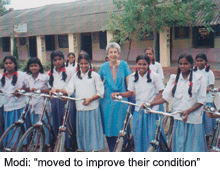 If it were not for the humble pedal pusher, Balutai Shinde, Jyoti Bhalerao, Archana Pachange and other teenage girls of Nimgaon Bhogi, a village 70 km from Pune, would have never entered secondary education. “My parents would have found a suitable match for me. Instead, now they say that marriage can wait until I graduate from college,” says Jyoti.
If it were not for the humble pedal pusher, Balutai Shinde, Jyoti Bhalerao, Archana Pachange and other teenage girls of Nimgaon Bhogi, a village 70 km from Pune, would have never entered secondary education. “My parents would have found a suitable match for me. Instead, now they say that marriage can wait until I graduate from college,” says Jyoti.
For these girls in the age group 11-18, secondary education has become a reality rather than an unfulfilled wish because they have been able to cycle to school, and a few of them to college. With their parents earning barely enough to put food on the table, they are indebted to Pune-based Armene Modi, who has provided free bicycles to over 600 girls in Ahmednagar district near Pune, through her NGO, Ashta No Kai. “It’s Japanese for ‘working towards a brighter future’,” says Modi.
A Columbia University-educated English teacher who was teaching the subject in colleges in Japan, she experienced a change of heart after reading May You Be The Mother of a 100 Sons by Elisabeth Bumiller. Modi was struck by remorse that 61 percent of Indian women are illiterate. She quit her job as English professor at the J.F. Oberlin University, Tokyo, and returned home to Pune in 1998 to establish a women’s literacy project. “I was moved to do something to improve their condition and started kishori mandals (clubs for teenage girls) and self-help groups to enable women to start small businesses,” she recalls.
When an appeal in local newspapers for second-hand bicycles in 1998 elicited “an encouraging response,” Modi shared the idea of a bicycle bank with her friends and former students in Japan, who funded the purchase of 100 pedal-wheelers for a bicycle bank. A bikes-rental service was launched for girl students in remote villages, to enable them to cycle to secondaries in neighbouring market towns. “Most teenage girls were forced to abandon their education mid-way because they had to walk up to 10 km to attend school for secondary and higher education. Parents, concerned for their safety, would rather get them married at early ages than run the daily risk of their trudging through the deserted country-side. The bicycle bank made it easy for them to ride to school,” says Modi.
Enthused by its success, in 2004 Modi offered nine scholarships for girls. Since then she has been able to increase the number of scholarships, thanks to the generosity of donors in Japan. Last year she was able to secure 57 scholarships for girls wishing to pursue professional degree programmes.
To make loanee girls responsible for borrowed bikes, each loanee has to deposit Rs.150, which is refunded after completion of class X. Currently over 300 bicycles are out on loan to girl students. “A girl child who has completed her primary education is likely to forget whatever she has learned once she gets married, and lapses into illiteracy. But this doesn’t happen if a girl studies at least up to class X, which is a condition the bank insists upon,” says Modi, who reveals that every bike is sponsored by companies or individuals. “Fortunately, a bicycle is eco-friendly and lasts for a long time,” she says. So does education.
Huned Contractor (Pune)